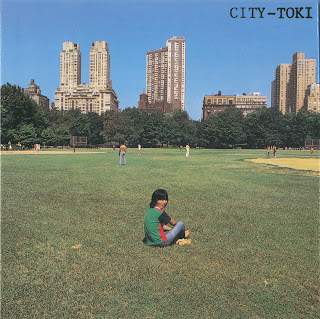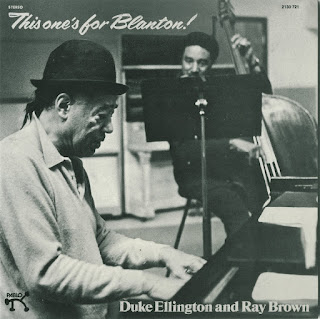
barabara sounds sez:
It's about time I posted this, the companion piece to my earlier post (back in November) of Counter Current. I'm not sure why I've held it back till now. Maybe because it's sparer, less 'straightforward' — I'm tempted to say edgy, but that would give the wrong impression — it demands more attention and grabs you in a rather different place. But it's not because I like it any less.
Even though it was recorded during the same sessions as Counter Current, this is a very different album. As you can tell, it's just the two of them, Terumasa Hino and Masabumi Kikuchi, just trumpet and piano, sometimes together other times exploring out there on their own. Curiously, the cover art is in bold color, whereas the sleeve for Counter Current is sumi ink on washi white — but Edges is by far the more monochromatic in its soundscapes. Here's a nice review from All About Jazz, says it better than I can...
The similarities between two new releases by Japanese legends Terumasa Hino and Masabumi Kikuchi are obvious. Both were recorded within the same two weeks at the same studio. Both share broadly painted abstract covers on their appealing LP-style gatefold sleeves. Both are mostly originals by the pair, including two versions of two pieces book ending each disc. Even the aesthetics, despite the first being a duet and the other a quintet, have something in common. Palpably companion pieces, for all their similarities, these are distinct albums. But one thing they both contain is possibly the most surprising. Though continuing a partnership begun decades ago, the albums don't demonstrate an expected easy comfort; that is their strength.
Edges is an uncommon duet between an unusual pairing. Piano and trumpet inhabit a similar tonal range so any counterpoint is of a subtler breed. The eight pieces, including the two takes of the title track that begin and end the album, are aural representations of the album artwork: painted in bold expressionistic strokes. What is fascinating though is the tangible sense of tension. When one listens to a duet, breezy dialogue or spirited agreements are usually the expectation. Hino and Kikuchi are obviously old friends but ones who seem to have little in common. When their careers began, they were closer in spirit; the intervening years have separated them. They are like adults who are friends because they grew up next to each other. This turns Edges into a session whose appeal is in its agitation. Each author has his pieces dominated by the other musician and the solo pieces are almost exhalations. "I Fall In Love Too Easily," the album's only standard, exemplifies this ironic relationship.
personnel:
Terumasa Hino: trumpet; Masabumi Kikuchi: piano.
tracks:
Edges (ver. 1); Is It?; Alone, Alone And Alone; Can't Describe; I Fall In Love Too Easily; Dad, I Miss You (trumpet solo); My Kinda Yesterday (piano solo);
Edges (ver. 2)




